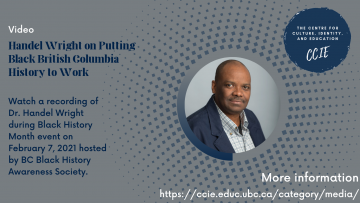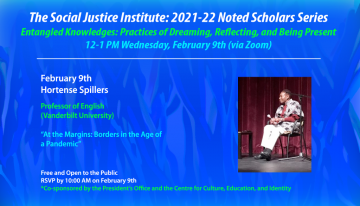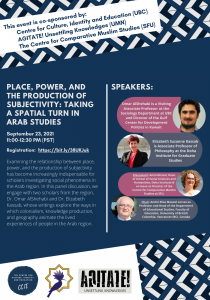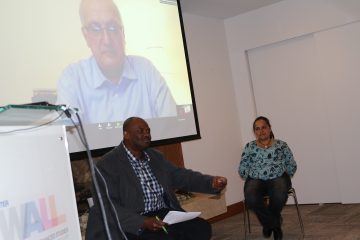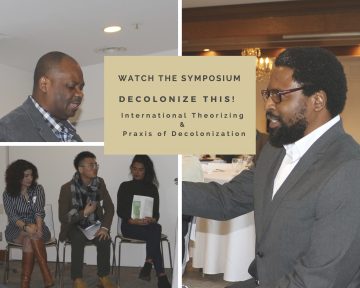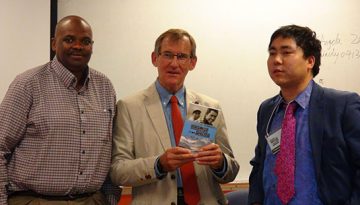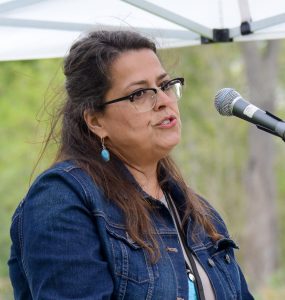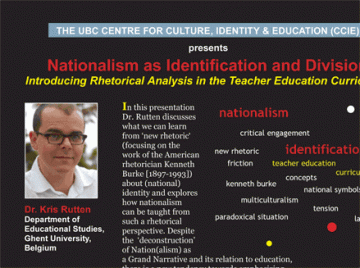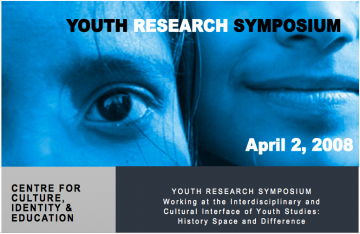Video: Putting Black British Columbia History to Work, Prof. Handel Wright
Black History Month event on February 7, 2021 hosted by BC Black History Awareness Society. Guest Speaker: Prof. Handel Kashope Wright, Director, Centre for Culture, Identity & Education, UBC.
Watch: “Decolonizing Higher Education Internationally” (panel)
Decolonizing Higher Education Internationally
“The enduring educational challenges of setting horizons of hope beyond modern-colonial imaginaries” by Vanessa de Oliveira Andreotti (UBC)
“What Does it Take to Decolonize Palestinian Higher Education? ” by André Elias Mazawi
“Youth Activism and Academia as Public Sphere” by Handel Kashope Wright.
Watch the Symposium: Decolonize This! International Theorizing and Praxis of Decolonization
The Centre for Culture, Identity and Education, in collaboration with the Peter Wall Institute for Advanced Studies at UBC, organized a symposium on decolonizing approaches to culture and education, at the Peter Wall Institute on November 26th, 2018.
Watch: “Escape from Tibet” Book Discussion
Each year, thousands of Tibetan refugees, many of them children, risk death from exposure and frostbite to escape political oppression by climbing over the highest mountain range in the world, the Himalayas. Nick Gray, an author and television producer who has been making award-winning documentaries for more than 30 years, captured this journey in his risky 1997 film Escape from Tibet. Among the group of refugees he followed were Pasang and Tenzin, young brothers who became the focus of the film that Gray has now turned into a book: an “astonishing true record of endurance, of the triumph of the human spirit, told as a real-life adventure story.” Tenzin joins Gray to talk about their collaboration, their journey and where the brothers are today.
Indigenous Praxis and World Majority Peoples’ Identity Politics
We Own Ourselves: The Role of Indigenous Knowledge Systems, Self-Definition and Self-Determination in Indigenous Justice
Introduction by Handel Wright, Linc Kesler, and Sunera Thobani
Panel Discussion by Rain Daniels, Dorothy Christian, and Charles Menzies.
Nationalism as Identification and Division Introducing Rhetorical Analysis in the Teacher Education Curriculum
In this presentation Dr. Kris Rutten discusses what we can learn from ‘new rhetoric‘ (focusing on the work of the American rhetorician Kenneth Burke [1897-1993]) about (national) identity and explores how nationalism can be taught from such a rhetorical perspective. Despite the ‘deconstruction’ of Nation(alism) as a Grand Narrative and its relation to education, there is a new tendency towards emphasizing national identity, caused by trends such as globalization and multiculturalism. In the language and literature teaching curriculum, this paradoxical situation often causes friction for teachers who are very often expected to teach standard language and national literature. Dr. Rutten’s claim is that rhetoric is a possible tool to deal with these tensions in the curriculum. He will focus on the rhetorical construction of Flanders, Belgium, as a case-study and will argue that Burke’s concepts are useful tools to make students ‘symbol-wise’: to understand the way national symbols work, and to develop critical engagement with, as well as on behalf of, those symbols.
Watch: “From the Margins to the Centre? Girlhood and the Contradictions of Femininity Across Three Generations” by Mary-Jane Kehily
New femininities suggest that young women are moving from the margins to the centre. No longer content with subordinate status in the bedroom or on the periphery of youth cultures, young women appear to have found their voice as the ‘can do’ girls of neo-liberalism. This paper charts the social change that has had a dramatic impact upon gender relations and particularly the emergence of new femininities that mark growing up girl as a distinctly different experience for young women in the contemporary period. Familiar tropes of new femininities position young women as agentic, goal-oriented, pleasure seeking individuals adept at reading the new world order and finding their place within it. Has femininity finally found a skin that fits or are there cracks in this unparalleled success story? The paper examines this question intergenerationally by looking at young women’s experience across time. Specifically, the paper will explore the implosion of the public-private spheres in relation to the experience of being a girl as articulated by three generations of women.
Watch: “Moral Panic in a New Age: Suspicion, Dread and Evolving Conceptions of Youth and the ‘Dangerous classes’ in Urban Space” by Joanne Dillabough
In this presentation I showcase the beginnings of a theoretical approach which attends to the spatial relationships operating between young people, new modes of urban surveillance within and outside schools, and the global problematic associated with moral panic operating in the affluent ‘West’.
